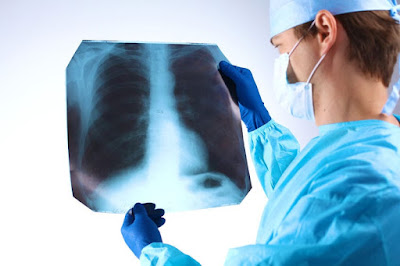Lung cancer: Causes, Symptoms, and Treatment
Lung cancers can affect almost any part of the lung, but 90-95% of lung cancers are caused by epithelial cells, cells that line the larger and smaller airways (bronchi and bronchioles), which is why lung cancers are often referred to as bronchogenic or bronchogenic cancers. (Another word for cancer is carcinoma.) Cancers can also arise from pleura (called mesotheliomas) or rarely from supporting tissues such as blood vessels, within the lungs.
Symptoms of Lung cancer:-
In the early stages, there are generally no signs or symptoms. Lung cancer symptoms grow as the disease progresses.
Lung cancer's main symptoms include:-
- A cough that doesn't go away within two to three weeks
- A long-standing, worsening cough
- Infections in the chest that keep returning
- Blood spitting out
- An ache or pain while coughing or breathing
- Persistent breathlessness
- Persistent weakness or absence of energy
- Appetite loss or unexplained loss of weight
If you or your family member have such symptoms, immediately visit a doctor. If you suffer from lung disease, you can visit KRIMS Hospital, and get treated by the best lung specialist in Nagpur.
Causes of Lung Cancer:-
Lung cancer can occur due to various causes, but it is smoking that is the most common cause of lung cancer.
- An ache or pain while coughing or breathing
- Persistent breathlessness
- Persistent weakness or absence of energy
- Appetite loss or unexplained loss of weight
If you or your family member have such symptoms, immediately visit a doctor. If you suffer from lung disease, you can visit KRIMS Hospital, and get treated by the best lung specialist in Nagpur.
Causes of Lung Cancer:-
Lung cancer can occur due to various causes, but it is smoking that is the most common cause of lung cancer.
Causes of lung cancer are as follows:-
Smoking:-Tobacco smoke consists of around 4000 chemicals that are carcinogenic. Smoking cigarettes causes lung tissue injury. Lung tissue is capable to some degree of repairing the damage. Repetitive smoking, however, damages the tissue and the cells begin to function unusually, causing lung cancer.
Second Hand Smoking:-The inhalation of cigarette smoke by nonsmokers is second-hand smoking or passive smoking. For people who live and work with smokers and are prone to cigarette smoke, there is a chance of lung cancer.
Genetics:-There is a risk that nonsmokers with genetic defects will develop lung cancer. There is a chance of developing cancer if the person inherits those genes that interfere with DNA repair.
Exposure to Radon Gas:-As a natural decay product of uranium, radon gas is emitted and enters the air through soil, rock, and water. Radon gas levels that are abnormally high are dangerous and raise the risk of lung cancer.
Lung Diseases:-The risk of lung cancer is increased by some lung diseases. The chance of developing lung cancer in nonsmokers is increased by chronic obstructive pulmonary disease and pulmonary fibrosis.
Air pollution:-The chances of developing lung cancer are increased by living in toxic environments and inhaling hazardous chemicals. Harmful gases emitted from cars, industry, and power plants are sources of air pollution.
Smoking:-Tobacco smoke consists of around 4000 chemicals that are carcinogenic. Smoking cigarettes causes lung tissue injury. Lung tissue is capable to some degree of repairing the damage. Repetitive smoking, however, damages the tissue and the cells begin to function unusually, causing lung cancer.
Second Hand Smoking:-The inhalation of cigarette smoke by nonsmokers is second-hand smoking or passive smoking. For people who live and work with smokers and are prone to cigarette smoke, there is a chance of lung cancer.
Genetics:-There is a risk that nonsmokers with genetic defects will develop lung cancer. There is a chance of developing cancer if the person inherits those genes that interfere with DNA repair.
Exposure to Radon Gas:-As a natural decay product of uranium, radon gas is emitted and enters the air through soil, rock, and water. Radon gas levels that are abnormally high are dangerous and raise the risk of lung cancer.
Lung Diseases:-The risk of lung cancer is increased by some lung diseases. The chance of developing lung cancer in nonsmokers is increased by chronic obstructive pulmonary disease and pulmonary fibrosis.
Air pollution:-The chances of developing lung cancer are increased by living in toxic environments and inhaling hazardous chemicals. Harmful gases emitted from cars, industry, and power plants are sources of air pollution.
Treatment for Lung Cancer:-
The type of lung cancer you have, how advanced it is and your general health will rely on treatment.
Surgery:- If you have non-small cell lung cancer at an early stage, you will most likely have tumor removal surgery. Three major forms of surgery exist:
1. Lobectomy:- Removal of a lobe wedge.
2. Resection:- Part of the lobe is removed.
3. Neumonectomy:- Removing the whole lung.
Surgery for the treatment of small-cell lung cancer is rarely used. Chemotherapy is the primary cure for small-cell lung cancer. In contrast, for the treatment of stage I-III small cell lung cancer, radiotherapy can be used.
Staging:-Staging is based on the TNM system and is defined by the size of the primary tumor or whether it has spread to, or more generally too, the draining lymph nodes, especially the liver, bones, adrenal glands, and brain.
Radiation therapy (Radiotherapy):-Radiation therapy (radiotherapy) When surgery is not an option, you can have radiation therapy for early-stage lung cancer. After surgery, or as a palliative treatment, radiotherapy can also be used.
Chemo-therapy:-To kill cancer cells, chemotherapy uses anti-cancer medicines. It can be used to treat both small cell and lung cancer in non-small cells. To reduce a tumor, chemotherapy may be used before surgery. It can be used to increase its efficacy before or in conjunction with radiation therapy, before cancer shrinkage surgery, or after surgery to decrease the chance of cancer coming back.
Immunotherapy Programs:-In order to stimulate the body's immune system, immunotherapy uses particular drugs and can be used to treat some forms of non-small cell lung cancer.
Staging:-Staging is based on the TNM system and is defined by the size of the primary tumor or whether it has spread to, or more generally too, the draining lymph nodes, especially the liver, bones, adrenal glands, and brain.
Radiation therapy (Radiotherapy):-Radiation therapy (radiotherapy) When surgery is not an option, you can have radiation therapy for early-stage lung cancer. After surgery, or as a palliative treatment, radiotherapy can also be used.
Chemo-therapy:-To kill cancer cells, chemotherapy uses anti-cancer medicines. It can be used to treat both small cell and lung cancer in non-small cells. To reduce a tumor, chemotherapy may be used before surgery. It can be used to increase its efficacy before or in conjunction with radiation therapy, before cancer shrinkage surgery, or after surgery to decrease the chance of cancer coming back.
Immunotherapy Programs:-In order to stimulate the body's immune system, immunotherapy uses particular drugs and can be used to treat some forms of non-small cell lung cancer.




Comments
Post a Comment